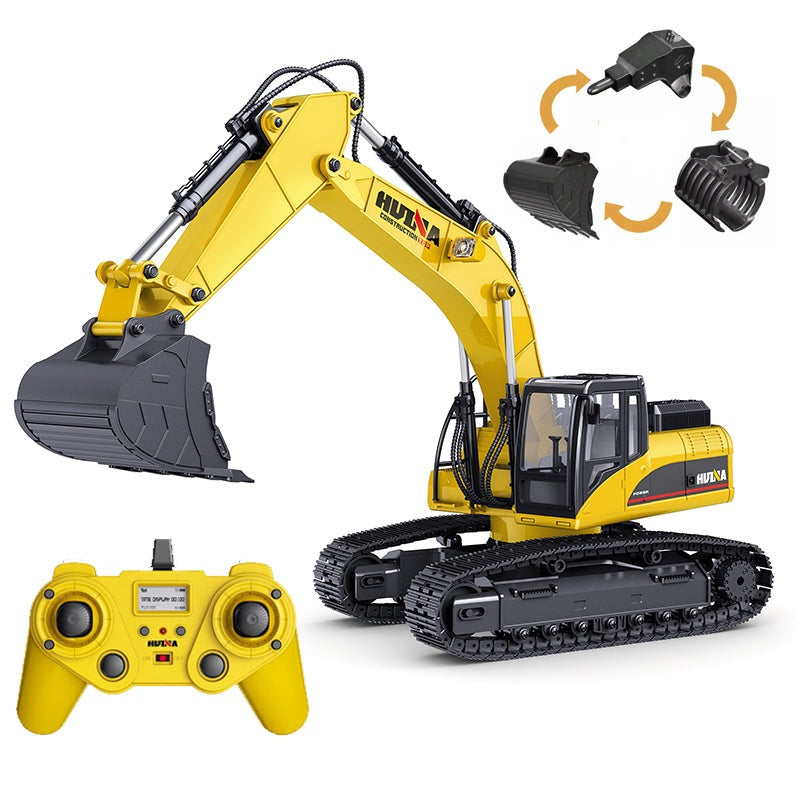Recognizing Just How Excavator Works and Its Effect on Performance
Excavators play an essential role in construction and mining procedures, relying upon a complex interplay of mechanical and hydraulic systems. Their ability to perform a variety of jobs depends upon both their layout and the modern technology integrated within. Recognizing these components can significantly affect operational efficiency and performance. As innovations continue to reshape the sector, one need to think about how these adjustments will influence future practices and performance.
The Essentials of Excavator Mechanics

The Duty of Hydraulic Systems in Excavators
At the heart of excavator procedure exists the hydraulic system, which plays a critical function in powering the maker's movements and features. This system makes use of pressurized hydraulic liquid to transfer energy, enabling different actions such as moving, excavating, and training. By utilizing the principles of hydraulics, excavators can execute tasks with exceptional precision and force, improving total functional efficiency.The hydraulic system contains key elements, consisting of cyndrical tubes, pumps, and shutoffs, which work together to regulate the circulation and direction of the fluid. When the operator involves the controls, the hydraulic liquid is routed to details cyndrical tubes, converting the driver's commands right into physical activity. This system permits smooth and responsive activities, which are necessary in building and construction and excavation settings. double e volvo rc excavator. The effectiveness of the hydraulic system straight affects the efficiency and adaptability of the excavator, making it an essential element in modern excavation procedures
Trick Elements of an Excavator
Recognizing the essential elements of an excavator is important for understanding how this powerful device operates. An excavator contains numerous significant aspects, including the undercarriage, residence, pail, boom, and arm. The undercarriage provides security and movement, typically including wheels or tracks to navigate different terrains. Your house has the engine and hydraulic systems, enabling the driver to control activity and power the equipment. The boom expands from your house, allowing vertical reach, while the arm links to the bucket, helping with digging and lifting operations.Additionally, the taxi houses the driver, equipped with controls for exact handling. Each of these components plays a vital duty in the excavator's total performance, adding to its effectiveness and performance on construction websites. Comprehending these components helps in keeping and optimizing excavator efficiency, guaranteeing jobs are finished securely and effectively.
Accessory Convenience and Its Advantages
Add-on convenience is a necessary facet of excavators, enabling operators to switch between different devices tailored for specific tasks. This adaptability not only enhances task effectiveness however likewise contributes to cost-effectiveness by minimizing the requirement for several makers. Comprehending the various kinds of attachments readily available can greatly affect the general efficiency and capability of an excavator on work websites.
Sorts of Attachments
While excavators are primarily recognized for their digging abilities, their true flexibility hinges on the large variety of accessories offered. These attachments boost the excavator's capability, permitting it to do numerous tasks past excavation. Typical accessories include pails (for excavating and scooping), hydraulic thumbs (for understanding materials), and augers (for drilling holes) Grapples are utilized for relocating and handling particles, while rippers can separate hard surface areas. Other specialized add-ons, such as plates and rakes, allow excavators to adapt to particular job requirements. This variety not only raises the maker's utility throughout various industries, including construction, demolition, and landscape design, but additionally enables drivers to customize their equipment to fulfill certain project demands successfully.
Boosted Task Efficiency
Optimizing task efficiency is a key advantage of utilizing various excavator accessories. Different attachments permit an excavator to do several tasks without needing to switch over devices, saving valuable time and labor. For example, making use of a hydraulic hammer can damage concrete while a bucket attachment can dig deep into soil, enabling a smooth workflow. This flexibility lowers downtime connected with devices adjustments and improves performance on-site. Additionally, specialized add-ons improve accuracy in tasks such as grading or landscaping, bring about higher quality results. The capacity to adapt to different job needs not just streamlines operations but also reduces the requirement for extra equipment, making certain that tasks are finished promptly and properly. Generally, add-on versatility considerably contributes to enhanced task effectiveness in excavation job.
Cost-Effectiveness and Versatility
Cost-effectiveness is a significant advantage of making use of functional excavator attachments. These attachments enable a solitary excavator to execute multiple tasks, minimizing the demand for added equipment and labor - double e volvo rc excavator. By changing between pails, hammers, and grapples, operators can deal with numerous tasks, from digging to demolition, consequently optimizing equipment usage. This versatility not just decreases operational costs however likewise lessens downtime linked with transforming equipment. In addition, the capacity to tailor excavators with specialized add-ons improves productivity, as they can effectively manage varied jobs according to task needs. In conclusion, the mix of cost-effectiveness and flexibility in excavator add-ons adds to boosted operational efficiency and resource appropriation in construction and excavation projects

Advanced Modern Technology in Modern Excavators
Modern excavators are significantly furnished with innovative innovation that transforms excavation processes. Automation improves operations, while enhanced fuel performance lowers functional expenses. Additionally, smart control systems boost accuracy and safety, noting a considerable development in excavation equipment.
Automation in Excavation Processes
As excavation modern technology progresses, automation has become an important element in boosting effectiveness and precision on work sites. Modern excavators are equipped with innovative automated systems that assist in tasks such as grading, digging, and trenching with marginal operator intervention. These systems use sensors, GPS, and equipment discovering algorithms to assure precise placing and deepness control, significantly lowering the margin for error. Additionally, automation permits drivers to concentrate on calculated decision-making instead than manual controls, resulting in boosted productivity generally. Such advancements not just streamline process yet also improve safety and security by reducing human error in complex operations. Subsequently, the assimilation of automation in excavation processes represents a substantial improvement in building and construction technology, driving the market in the direction of better efficiency and efficiency.
Boosted Fuel Efficiency
Improvements in modern technology have actually also caused substantial renovations in fuel efficiency for modern excavators. Modern equipments are equipped with sophisticated engines that maximize power output while lowering fuel intake. These engines use cutting-edge burning modern technologies, such as turbocharging and straight gas shot, to boost efficiency and performance. In addition, light-weight products in building minimize general weight, enabling for less energy expenditure throughout procedure. The intro of variable rate controls allows operators to adjust engine efficiency according to details jobs, better lessening fuel use. have a peek at this website As a result, these enhancements not just reduced functional expenses however also contribute to ecological sustainability by lowering exhausts. Generally, improved fuel efficiency in excavators is a vital growth that strengthens performance and economic practicality in the construction sector.
Smart Control Equipment
While operators navigate increasingly complex job websites, smart control systems in excavators have actually emerged as essential devices for enhancing performance and precision. These innovative technologies make use of sensors and formulas to monitor different criteria such as tons weight, surface conditions, and functional efficiency. By immediately readjusting hydraulic functions, smart systems enhance machine efficiency, causing improved productivity and lowered wear on elements. In addition, drivers take advantage of instinctive interfaces that supply real-time feedback and diagnostics, permitting informed decision-making. This combination of modern technology not only improves procedures yet also lessens human error, contributing to much safer workplace. As the building and construction industry continues to advance, wise control systems will certainly play a vital function fit the future of excavator performance and effectiveness.
Enhancing Functional Efficiency With Excavators
Excavators play a vital function in boosting operational effectiveness throughout various building and construction and excavation projects. Their versatility permits multiple jobs, including excavating, training, and material handling, which enhances operations and reduces the requirement for extra tools. With effective hydraulic systems, excavators can perform heavy-duty jobs with accuracy, considerably reducing the time needed to total jobs. The integration of advanced innovation, such as general practitioner and automated controls, better optimizes their operation, allowing operators to accomplish higher precision and lower material waste. Furthermore, modern-day excavators are made to consume less fuel and minimize emissions, contributing to both expense savings and ecological sustainability. By utilizing excavators efficiently, building teams can enhance productivity, fulfill task target dates, and enhance overall site administration. This multifunctionality and effectiveness make excavators vital tools in the modern building and construction landscape.
The Future of Excavators in Building and Mining Industries
As the construction and mining industries advance, the future of excavators is poised for substantial improvement driven by technological innovation and transforming operational needs. Developments in automation and expert system are improving excavator capabilities, permitting improved precision and effectiveness in operations. Self-governing excavators are arising, minimizing the need for human treatment and minimizing the threat of accidents.Moreover, the combination of telematics and IoT modern technology enables real-time surveillance of device efficiency and predictive upkeep, enhancing uptime. Green designs, consisting of electric and hybrid designs, are obtaining grip, straightening with sustainability objectives within the industry.Additionally, the use of sophisticated products and lighter layouts enhances fuel performance while keeping performance criteria. As these fads progress, excavators will play an important Get the facts function in satisfying the raising needs for performance and safety in construction and mining, eventually transforming functional landscapes.
Regularly Asked Inquiries
How Do Climate Condition Affect Excavator Efficiency?

Climate condition substantially affect excavator performance, as rain and mud can prevent grip and stability, while extreme temperatures might influence hydraulic systems. Operators has to adapt to these variables to guarantee excellent performance and safety throughout operations.
What Safety And Security Procedures Should Operators Comply With While Using Excavators?
Safety measures for excavator drivers include putting on proper personal safety devices, conducting pre-operation assessments, ensuring appropriate interaction with ground workers, keeping a safe range from overhead dangers, and adhering to well established operational procedures to prevent mishaps.
Just How Typically Should Excavators Be Maintained for Ideal Efficiency?
Excavators ought to be kept on a regular basis to guarantee peak efficiency, generally every 250 operating hours or as defined by the manufacturer. Routine checks enhance dependability, prevent unforeseen breakdowns, and prolong the lifespan of the devices.
What Is the Ordinary Lifespan of an Excavator?
The typical life-span of an excavator usually varies from 10,000 to 15,000 hours of procedure. Elements affecting durability consist of maintenance practices, running problems, and the quality of the maker itself, influencing overall efficiency and performance.

Can Excavators Run on Unequal Terrain Properly?
Excavators can run efficiently on irregular surface due to their verbalized layouts and adjustable tracks. These attributes enable them to keep stability and grip, page allowing reliable operation in tough atmospheres commonly come across in construction and landscaping projects. Each of these elements plays a vital function in the excavator's total functionality, adding to its efficiency and effectiveness on building websites. Optimizing work efficiency is a main benefit of utilizing different excavator accessories. While operators navigate progressively intricate job sites, smart control systems in excavators have emerged as necessary devices for improving performance and accuracy. Excavators play an essential role in enhancing operational efficiency across various building and construction and excavation tasks. Advancements in automation and man-made knowledge are improving excavator capacities, permitting for improved precision and performance in procedures.
Comments on “10 Things to Consider Before Purchasing a remote control excavator for Your Company”